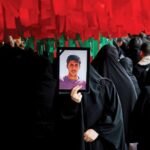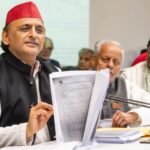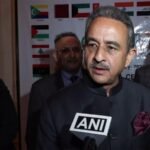
By Mohammad Sufi
On February 26th, I was engaged in a 30-minute interview with Dr. Mohammad Laeequllah Khan, the Editor-in-Chief of Saudi Urdu Radio, operating under the prestigious banner of the Saudi Broadcasting Authority in the Kingdom of Saudi Arabia. The conversation spanned a range of topics, providing insights into my extensive experience with Saudi Arabia since 2012, my journey in journalism, and the role of Arabian Times in media discourse. The discussion expanded to encompass governance and achievements within Saudi Arabia, under the leadership of King Salman bin Abdul Aziz al Saud and Prime Minister Mohammad bin Salman. Through my perspective, we explored the ambitious agenda outlined in Vision 2030 and its implications for the nation’s progress. Bilateral ties between India and Saudi Arabia emerged as another focal point, highlighting the significance of collaboration and mutual understanding between the two nations. Furthermore, we brainstormed ideas to inspire and engage listeners from diverse backgrounds residing in Saudi Arabia, contemplating future programmatic initiatives tailored to their interests and aspirations. This segment underscored the commitment to catering to the varied preferences of Saudi Urdu Radio’s listeners. The tête-à-tête between Dr. Mohammad Laeequllah Khan and Mohammad Tarique Saleem, Founder and Managing Editor of Arabian Times, exemplified the essence of cross-cultural dialogue and collaboration in the realm of media.

Q. When and in what context did you come to Saudi Arabia for the first time?
A. I first came to Saudi Arabia in 2012, invited by the then Saudi Ambassador to India, Mr. Faisal Hasan Trad. As a journalist since 1985, I initiated Arabian Times, aiming to highlight the bilateral ties between India and the Middle East. Mr. Trad provided me with an opportunity to visit Saudi Arabia, where I published a Special Issue on King Abdullah’s Glorious Achievements. Additionally, I was honored with an invitation for Hajj in 2012 by the Ministry for Information, Saudi Arabia.
Q._ Which areas of Saudi Arabia have you seen ?
A. On my visit to Saudi Arabia I have seen Makkah, Madinah, Arafat, Muzdalifah, Jeddah, Kingdom Tower, and various historical sites in Riyadh.
Q._ Did you came here for any other program apart from Hajj and Umrah?
A. After 2012, I always came here to perform Umrah.
Q. Wherever journalists go anywhere, they look at that place, that country with special eyes and tell everything to their readers or listeners or viewers. What did you see in Saudi Arabia?
A. During my first visits to Saudi Arabia, I was immediately struck by the atmosphere of reverence and hospitality that permeated the experience. The moment I stepped into Jeddah Airport for immigration, the hauntingly beautiful Azaan, washed over me, signaling the beginning of a journey filled with cultural richness and spiritual significance.
One aspect that stood out prominently was the demeanor of the Saudi police force. Unlike the often stern or intimidating presence seen in other countries, the Saudi police exhibited a remarkable level of gentleness and professionalism, particularly in the holy cities of Makkah and Madinah. Their treatment to pilgrims during the Hajj and Umrah is exemplary, with not a single instance of mistreatment reported despite the immense crowds numbering in the millions round the year.
Furthermore, the hospitality extended by the Saudi people is unparalleled. From the arrangements made for pilgrims to the general services provided, there was an evident commitment to ensuring the comfort and satisfaction of all visitors. Even amidst the colossal gathering of million pilgrims during Hajj and Umrah, not a single complaint about mismanagement is being heard, a testament to the meticulous planning and execution overseen by Custodian of the Two Holy Mosques, King Salman bin Abdul Aziz al Saud, and Prime Minister Mohammad bin Salman. Overall, my experience in Saudi Arabia was characterized by a deep sense of respect for its cultural traditions, admiration for its hospitality, and appreciation for the commitment to facilitating a meaningful pilgrimage experience for millions around the world.
Q. When and how did you join journalism?
A. I began my journey in journalism during my schooling days at Saint Joseph College in Allahabad, Uttar Pradesh, India, when I sought to earn some pocket money by proofreading law books. This early exposure to the world of publishing ignited my interest in the field. From 1985 to 1999, I honed my skills as a proofreader for esteemed English dailies such as ‘The Pioneer’ and National Herald, contributing to the meticulous accuracy of their publications. In 1999, I seized an opportunity to transition into reporting for Saamana, one of Mumbai’s leading Hindi dailies, where I delved deeper into the dynamic realm of journalism, covering a diverse range of stories and issues until 2008. Equipped with years of experience and a passion for storytelling, I embarked on a new venture to establish my own publication.
In pursuit of this goal, I registered the title “Arabian Times” with the Registrar of Newspapers, Government of India. In 2008, Arabian Times was born, heralding a new chapter in my journalistic career. With a commitment to journalistic integrity and a focus on quality reporting, Arabian Times quickly gained traction, boasting wide circulation that included readership among embassies in Delhi and consulates at the national level. Through dedication, perseverance, and a steadfast commitment to the craft, I transitioned from a humble proofreader to the founder and Managing Editor of a respected publication, realizing my vision of contributing to the rich tapestry of media discourse in India.
Q._ Tell us about Arabian Times, how did it start, how and where did it get acceptance ?
A. Arabian Times emerged as a testament to my passion for journalism and my ambition to establish a publication that would make a meaningful contribution to media discourse in India. Founded in 2008, the journey of Arabian Times began with the registration of its title with the Registrar of Newspapers, Government of India. This marked the inception of a new chapter in my journalistic career, where I assumed the role of both Founder and Managing Editor. From the outset, Arabian Times was guided by principles of journalistic integrity and a commitment to delivering quality reporting. These foundational values served as the cornerstone of our publication’s identity and helped us to quickly gain traction within the media landscape. Our dedication to thorough, accurate reporting resonated with readers, leading to a notable increase in circulation.
One significant milestone in the acceptance of Arabian Times came in 2012 when I was afforded the opportunity to visit Saudi Arabia by Mr. Faisal Hasan Trad, the former Ambassador of Saudi Arabia to India. This marked the beginning of a regular series of visits to the kingdom, deepening our engagement with the region and further enhancing the reputation of Arabian Times as a credible source of news and analysis related to Saudi Arabia and beyond. Through perseverance and unwavering commitment to excellence, Arabian Times has established itself as a respected publication with a wide readership, including embassies in Delhi and consulates at the national level. Our journey is a testament to the power of passion and dedication in realizing ambitious journalistic endeavors.
Q. Running an international magazine is not an easy task. How do you manage the financial assistance needed to keep everything running smoothly?
A. I have sold my land, car, jewelries and all my savings from the salary to make my mission comes true because Saudi Arabia has played an important role in upliftment of the downtrodden Indian Muslim community and the Muslims globally. Saudi Arabia has consumed maximum numbers of Muslims in land areas as it is the largest in the Middle East. Many other Muslim countries too like Dubai, Kuwait, Iran, Qatar, Oman, Egypt, Turkey etc. has played an important role in upliftment of the Muslims globally. Being Custodian of the two holy mosques I love Saudi Arabia and has given maximum exposure to the Custodian of the two holy Mosques late King Abdullah bin Abdulaziz Al Saud and now the present King Salman bin Abdul Aziz Al Saud and the Prime Minister Mohammad bin Salman a visionary and farsighted leader. Arabian Times is also putting maximum focus to strengthen Indo-middle east bilateral ties. Alhamdulillah now Arabian Times is running smoothly.
Q._ Which method of radio broadcasting do you consider more effective for reaching foreigners residing in Saudi Arabia, broadcasting in foreign languages tailored for the expatriate community, or broadcasting through international channels like the BBC targeting a broader audience ?
A. The effectiveness of radio broadcasting for reaching foreigners in Saudi Arabia varies based on factors like expatriate diversity and information preferences. Broadcasting in tailored foreign languages caters directly to expatriate linguistic and cultural needs, fostering connection and understanding. Conversely, international channels like the BBC provide broader access beyond expatriate groups, offering diverse content appealing to a global audience.
Q. What types of programs do you think will be more popular?
A. Programs covering reformation of ‘Vision 2030’, cultural, food, exclusive interviews highlighting the achievements of Indian investors with the support of Saudi government, entertainment, sports, and updates on Saudi government rules and policies are likely to be highly popular. Sports coverage taps into enthusiasts’ interests, fostering community engagement. Overall, a diverse mix of informative and engaging content is poised to capture the listener’s attention effectively.









